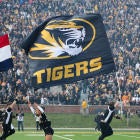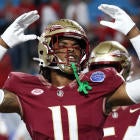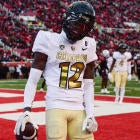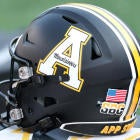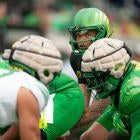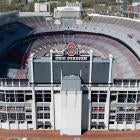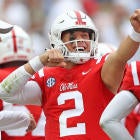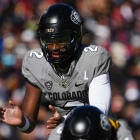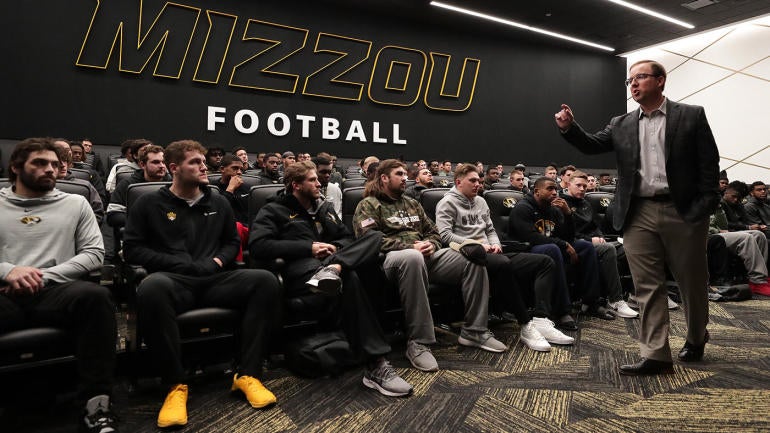
Eli Drinkwitz had more than a plan for a new house when he moved from Appalachian State to Missouri 18 months ago. First, the Tigers' new coach had to call compliance.
Before picking the location of his home in Columbia, Missouri, Drinkwitz inquired about a little-known NCAA rule that allows a recruiting advantage for coaches who live within a mile of campus. Recruits coming on an unofficial visit can actually stop by a coach's house if it's close enough to the university.
Those unofficial visits are fairly bare. They're paid for by the family of the prospect and don't include all the recruiting meals and perks. Except if a coach essentially has a home within walking distance.
"We might have thought about that," Drinkwitz said with a smile. "When we bought the house, we called compliance and said, 'Do you consider this to be a mile?'"
No tape measure was needed. This week, that is suddenly significant news.
Beginning June 1, college football coaches and prospects will be allowed face-to-face recruiting contact for the first time since NCAA sports were shut down March 13, 2020, due to COVID-19. The NCAA Council decided in April to end that recruiting dead period in all sports after 14.5 months.
The military industrial complex that is recruiting has long been straining at the leash. Both sides -- coaches and prospects -- can't wait to see each other again.
"They're all coming over to Eli's house," Drinkwitz said.
With all that pent-up recruiting energy ready to be released, the plans for a return to normal are anything but normal. Like Drinkwitz's house hunting, they are varied and creative. Several schools have official visits scheduled for every June weekend. Camps are planned. And for the first time ever, players can work out for teams.
"I think June is the biggest month in the history of recruiting." said CBS Sports football analyst Ross Tucker, host of the "Ross Tucker Football Podcast". "It's like they're fitting 10 months of recruiting into one month."
Those workouts, dubbed in-person evaluations (IPAs), have been strictly prohibited until this moment. Allowing them was the NCAA's way of letting recruiting catch up after COVID-19. These aren't NFL-style workouts. Players aren't allowed to interact with other.
"A quarterback can only work individually," Drinkwitz said. "He can't work with a wide receiver. A wide receiver, who is going to throw it to him?"
No one. That's the point of being creative. One coach and one player run through a set of drills for an hour. Think of them as mini combines.
Except schools who are into it full throttle will have the entire staff scattered across the field, each assistant working out a prospect. The most creative schools will welcome walk-ons, JUCOs, unsigned high school prospects from 2021 and Class of 2022 recruits.
"As soon as [the dead period] expires, there will be pandemonium," Florida coach Dan Mullen said. "It will be waves upon waves upon waves upon waves of kids coming to visit."
Throw in the transfer portal and the new one-time transfer rule, and you get the likes of
Arkansas State. New coach Butch Jones said he could have approximately 52 new players on the roster when June 1 rolls around -- with the possibility of more being added.
"It's going to be the ability to adapt to everything," Jones said "It's going to be a whirlwind."
All of it is another example of college football essentially coming down to a simple declarative sentence: It's all about recruiting. That means (almost) anything goes. That means getting creative to lure players to your place.
That means Cincinnati coach Luke Fickell considering a football version of Midnight Madness, inviting players to campus at 12:01 a.m. local time. Nice idea … except NCAA rules don't seem to allow it.
"Are prospects going to call you at 2 o'clock on a Sunday and say, 'Hey, I'm driving to Columbus, can I stop by and do a work out with you?'" Fickell said. "You don't have to publicize it; you just market to kids: 'We want you.'"
It's hard to overstate what a free-for-all this is going to be. That 1-mile rule? It was proposed by the Big 12 and passed in 2017.
The old rule prohibited the likes of Kansas State from basically taking recruits across the street from campus to Aggieville, the famous, only real entertainment district in Manhattan, Kansas.
"[Our recruiting coordinator] would get really frustrated because there were some really neat restaurants there," said KSU athletic director Gene Taylor. "We were limited as to where we could take them. He'd get so upset, 'Gene, this is ridiculous.'"
The frustration over being recruiting shut-ins has been building all over the country. There is already tons of evidence of recruits being signed having nothing more than Zoom contact with interested schools.
"This is my first time to evaluate them [in person]," Memphis coach Ryan Silverfield said. "I want to be able to sit down with a kid at dinner and say, 'Man, this is exactly what I want.' Or you may sit down and go, 'Whoa, he fooled me over FaceTime.'"
Texas State coach Jake Spavital already has established more of a casting-call atmosphere beginning June 1. He has yet to sign a high school prospect, leaning on the transfer portal. His IPAs are going to be wide open.
"If we don't have any luck with these transfer guys, we're going to work out all of the kids," Spavital said. "We're going to bring in the kids that everybody wants us to offer but no one wants. So you get them on campus to do a personal individual workout with them to see if this is what we're looking for."
Workouts were always prohibited, thought to be too professional, too NFLish, an abuse of the amateur ideal. That is until COVID-19 shut down everything.
"I was really surprised that they did it," North Carolina coach Mack Brown said of the NCAA allowing workouts. "I think it's smart and good. If I was a kid, I'd come work out for a coach, especially if I'm on the edge [of being signed]."
Brown had the same idea as Drinkwitz. Brown's wife, Sally, has spent two years scouting out a residence closer to campus. Turns out their new home is exactly 0.98 miles from UNC. You know what that means.
Recruits are limited to only five official visits, those paid for by the school. Prospects can take unlimited unofficial visits. Cue the Browns' unlimited hospitality.
"We couldn't do it in Austin because there weren't any houses a mile from campus," Brown said of his time at Texas. "So Sally actually looked for houses that were within a mile. As the crow flies, we had to check every one of them.
"We're going to have somebody at the house a lot."













